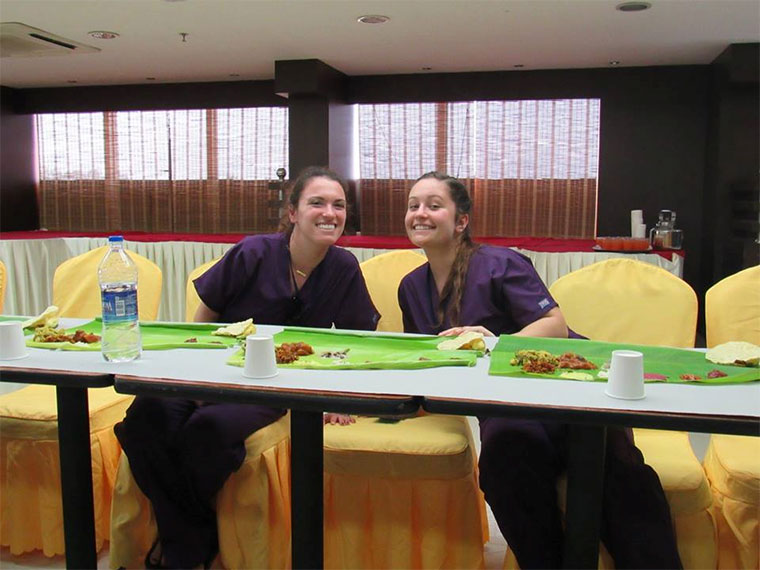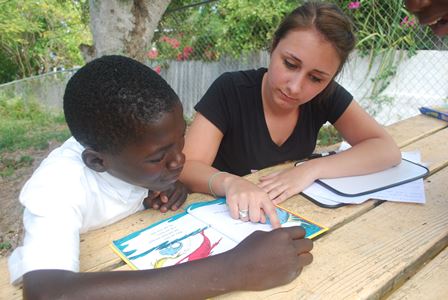
The hot and steamy southern Indian state of Kerala has been a prominent spice exporter since 3000 BCE. Given that, it comes as no surprise that what WCU junior Hailey Sherman misses most after a Winter Session trip to Kerala is “the amazing food.”
“Everything seems so bland here compared to the spices and flavors we had over there. I also miss the hospitality,” she is quick to add. “Even if someone was poor and had nothing, they would invite you into their home and make you a lavish meal.”
Sherman and nine other nursing students traveled with Rachel Joseph and Marcia Welsh, assistant professors in the department of nursing, to Kerala to explore core concepts of global health that impact community health and public health access to care in resource-limited settings. They observed Indian nursing students and their professors working to tackle the region’s health issues, which include malnutrition and infectious diseases.
“What surprised me the most about the trip was the level of autonomy of the Indian nursing students,” says Sherman. “They had a lot of responsibilities that I feel like students in America at the same level would not necessarily be able to take on. It was really cool to see how different and the same they were from us. As for the region itself, I was surprised by the poor sanitation and large population in the hospitals. Since health care is free there, everyone gets it but there are very limited resources and staff which puts a strain on the system.”
Study abroad is life changing. This may sound like a cliché but it rings true for Sherman and countless other WCU students who make the decision to travel abroad.
“The trip really did change my life,” says Sherman. “I’m always going to remember the experiences I had and the people I met, but most importantly I'm going to try to implement what I learned into my practice. Everyone comes from different backgrounds and cultures, but everyone is equal and deserves equal rights.”
One of the goals of WCU’s strategic plan is to broaden the University’s engagement with the world beyond our campus. As the plan states: WCU will be a leader in community engagement, building mutually beneficial relationships with external stakeholders locally and globally. These collaborations will extend the University’s impact within its home region and across the world, attract new resources to advance learning and community well-being and focus campus talent on the pursuit of the public good.
WCU is a university that understands the need to think internationally and prepare our students to be responsible global citizens. In 2014-15, the University sponsored 454 student international learning experiences — a 28% increase over the previous year. This included traditional study abroad programs, as well as participation in conferences, research opportunities, service learning, and music performances. In the last two years alone, the University has signed new international agreements with partners in Guatemala, Ireland, China, and the Cayman Islands. Currently, WCU has 25 active partnerships with colleague universities around the world.

The University continues to strengthen its presence in Latin America and the Caribbean. This past fall, President Weisenstein was part of a delegation of 18 university presidents that traveled to Cuba in an effort to continue the normalization of relationships between our countries. As a result of that visit, the American Association of State Colleges and Universities signed an agreement with the Cuban Ministry of Education that will provide new opportunities for American and Cuban students, faculty, and staff. WCU offered its first study abroad to Cuba during spring break 2016.
In May 2016, West Chester University will team up once again with Universidad Nacional (UNA), based in Heredia, Costa Rica, to co-sponsor the International Congress on Higher Education - Knowledge Crossing Borders. The conference will be held on the West Chester campus and feature presentations from faculty, staff and students from 11 different countries, including Italy, Kenya and Ireland. This is the fourth such conference co-sponsored by WCU and UNA.
WCU has made great strides internationally but there is still work to be accomplished, such as increasing the number of international students on campus. WCU’s 110 international students come from 50 countries, including the highest number ever this year from a partnership with the American College of Norway. However, these international students represent less than 1% of the student body. A new English-as-second-language program at WCU, which is launching in June 2016, should help to increase international enrollment. The program is offered in partnership with ELS International Services and is recruiting worldwide, with the largest number of students expected to come from Asia, the Middle East and South America. Participants will be granted a conditional admission to WCU upon successful completion of the language program.
WCU students learn a lot by engaging with other students and members of the community in locales like Kerala, India, but they also can learn a lot by traveling a few miles down the road. Take, for example, WCU’s longstanding relationship with the West Chester-based Melton Center. Annually, this center serves the needs of more than 48,000, ranging from elementary school students who come to the center for tutoring and mentoring to adults recovering from substance abuse who are offered support and a space to meet.
More than 70 WU students volunteered or worked at the Melton Center during the 2014-15 year. Some of these students painted and made repairs to the building while others organized car washes and other fundraisers. Some did service projects as part of their sorority or other co-curricular organization. Students and faculty from the College of Visual and Performing Arts offered weekly music classes. And some, like senior Erin Quillen, who began as a center volunteer, works as an America Reads academic coach in the New Directions After School program. A dual major in early grades preparation and special education, Quillen says she has improved her teaching and leadership skills by working at the center.
The Melton Center is just the tip of the iceberg. Through a wide range of programs and services, WCU is fulfilling its mission to serve local communities and the Commonwealth as a source of knowledge and skill development, a research center, a service provider, and a problem solver. The Dr. Edwin Cottrell Entrepreneurial Leadership Center is one such example of WCU’s responsiveness to the needs of our constituencies. The center serves as a catalyst for regional economic development by promoting entrepreneurship at WCU and throughout southeastern Pennsylvania via seminars and workshops, Global Entrepreneurship Week activities and the WCU Business Idea Competition.
Soon, the newly developed Center for Community Solutions will serve as a single point of contact for external stakeholders seeking University expertise. Via the center, faculty will be available to offer assistance to nonprofit organizations, provide professional expertise; and engage in research which can support business decision making.

In the health and human services arena, WCU community partnerships include the Southeastern Pennsylvania Autism Resource Center (SPARC), a nonprofit clinic primarily serving individuals on the autism spectrum. SPARC provides center- and community-based diagnostic, therapeutic, and educational services as well as consultative services to educational and community organizations, such as parent groups, schools, daycares, hospitals, and other medical providers. The partnership offers WCU graduate and undergraduate students training in autism and applied behavior analysis as well as the ability to deliver direct service to the center’s clients under the supervision of top clinicians in the field.
The University’s Speech and Hearing Clinic provides diagnostic and treatment services in speech-language pathology and audiology to the community and valuable clinical education to students in the department of communication sciences and disorders. Students are supervised by certified speech-language pathologists and audiologists who observe students during clinical sessions via video technology. Evaluation and treatment services are offered in a range of areas, including: articulation/phonology, developmental disorders, stuttering, aphasia, and traumatic brain injury.
The Center for Contemplative Studies also serves the community beyond our campus. The University opened the center in 2011, with the mission to create a culture for students, faculty, and the community to understand, apply and create a contemplative approach to life and learning. A variety of free public programs are offered throughout the academic year, including day-long mindfulness retreats. The center also offers a monthly seminar series for continuing professional education of clinicians and educators. In early 2016, the center received its largest gift ever, $250,000, from Pat and Diane Croce. This gift will raise awareness of the center both on and off campus, fund faculty release time and graduate assistants, and provide center staff with mental health first aid training.